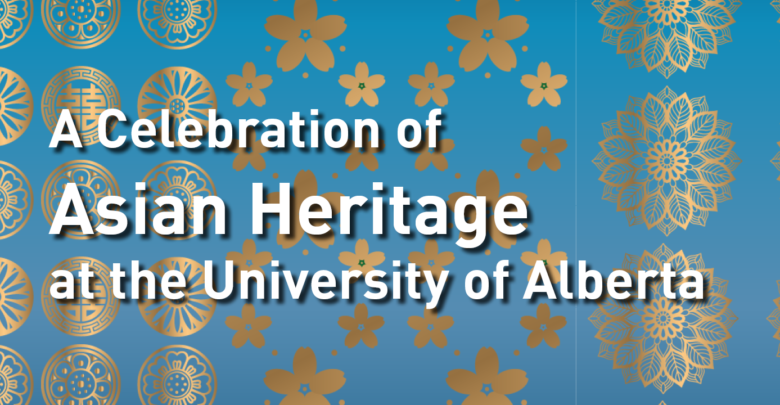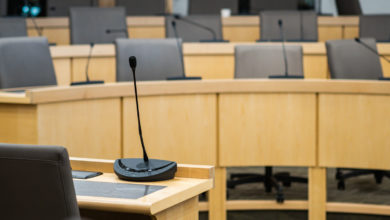Asian excellence and anti-racism efforts: U of A event celebrates Asian heritage
The event reiterated the university’s solidarity with the Asian community while also recognizing that there is more work to be done.
 Supplied: UAlberta International
Supplied: UAlberta InternationalThe University of Alberta hosted the Association of Chinese Canadian Professors (ACCP) and Engage India: Association of Professors (EIAP) to celebrate Asian heritage and condemn anti-Asian racism.
The virtual event was held over Zoom on May 19 in collaboration with UAlberta International, a group which facilitates global connections for the U of A community. Speakers at the event included representatives from the ACCP, EIAP, and the International Students’ Association (ISA). The event was open to the public.
Bill Flanagan, president of the U of A, shared the theme for 2021’s Asian Heritage Month, which is “Recognition, Resilience, and Resolve.” He recalled the adversity and achievements of Asian communities in Canada to highlight the “resilience” factor of the theme.
“Resilience resonates with all of us this year, particularly with COVID-19,” Flanagan said.
“This is a theme that points both to the contributions made, and also the adversity Asian communities have faced throughout Canadian history. Even as we celebrate the connections and the communities that have been built over many years, the theme highlights how there have been, and continue to be, acts of racism experienced by those with Asian heritage.”
Alongside other speakers, Flanagan condemned anti-Asian hate crimes, stating that he “joins in solidarity against all forms of anti-Asian racism, hate crimes, and discrimination.”
Flanagan also highlighted the importance of Asian leadership on campus. He recalled the Asian Community Leaders Summit, held by the ISA.
“These talks are key to maintaining the momentum of the anti-racism movement. With all of you, I believe that education and open exchange of ideas and perspectives builds recognition, resilience, and resolve, and contributes to a greater understanding, welcoming, and inclusive environment.”
According to Flanagan, there are more than 6,600 international students on campus from Asian countries. About five per cent of domestic students speak an Asian language as their mother tongue. Additionally, almost 10 per cent of academic staff have received a degree from an Asian institution.
Flanagan used both these statistics and art from the Mactaggart Art Collection of Chinese arts and the Kurimoto Japanese Garden to remind attendees of the influential impact of Asian communities on campus.
Steve Patten, the interim dean for the faculty of arts, strengthened the sentiment against anti-Asian racism, adding that campus needs to “go further.”
“We need to reflect on how we can use our teaching, our research, and institutional processes to work for change,” Patten said.
“How we do this will vary in the context in which we are teaching, learning, and engaging in research, but whether we find ourselves learning and sharing in our chemistry lab, or our political science lecture, we must challenge hate and work to achieve a sense of inclusivity that is needed for meaningful equity in our campus community.”
ACCP and EIAP presidents highlight achievements of Asian staff
Lijun Deng and Amit Kumar, presidents of the ACCP and EIAP respectively, drew attention to the achievements of Asian professors in academia.
Deng pointed to the work of professor Bo Cao on his project to use Artificial Intelligence (AI) for increased precision in depression screening. Cao’s work combines machine learning with social, personal, health, and genetic records of people diagnosed with major depressive disorder, potentially opening doors for more accurate diagnoses.
Deng also mentioned professor Dawei Zheng’s work identifying proteins blocking the body’s cholesterol removal, and researcher Tony Qiu who innovates in the area of self-driven cars.
“[ACCP] members are innovators, and they are making valuable contributions that are advancing research excellence at universities in Canada, and the wider world,” Deng said.
Kumar began with an anecdote about his own time in Edmonton after moving from India for his doctoral studies.
“I still remember my bus ride … to the university, not knowing what a ‘transfer’ means, and how I was helped by an old lady in purchasing my first transfer,” Kumar said. “Canada has become my home since then. This is true for a lot of us who have left our home and come here to make Canada our new home.”
Kumar also highlighted the work of Indian researchers, specifically in IC-Impacts projects, improving the quality of life of Canadians and Indians.
Chanpreet Singh, president of the ISA, also spoke at the event. He emphasized the ISA’s efforts against racism, saying that as a result of the Asian Community Leaders Summit, the ISA has taken action to train Resident Assistants and university residents to mitigate racist situations. He also shared that the ISA worked with the university to make racism reporting mechanisms easier to access.
Cen Huang reflects on the meaning of heritage and the importance of education
Cen Huang, vice-provost and associate vice-president of UAlberta International, opened the event. Huang began by reiterating the university’s commitment to equity, diversity, and inclusivity through solidarity against anti-Asian racism. Before the closing remarks, Huang reflected on her own definition of heritage, and how it affects her.
“Heritage encompasses many things,” Huang said. “It is about our ethnic groups of course, but it also includes cultural teachings and personal experiences. It is about who you are and where you have come from to get where you are today. For me, my heritage has shaped my values, my personality, my goals, and much more. Everywhere I have gone in life, I have taken my heritage with me, and I don’t mean only in terms of physical travel, but also in my personal journeys.”
Huang used Chinese idioms to reference her thoughts on the importance of education and inclusivity.
“‘三人行,必有我师’ (for any three people walking together, I’m bound to find a teacher among them), meaning that a modest learner will be able to learn from anyone around,” she said. “This is a major aspect of higher education and the vibrant learning community that is created through the diversity at the U of A. As we learn from others with different backgrounds, we learn about ourselves.”
Wendy Rodgers, the deputy provost, made closing remarks about the university’s commitment to equity and multiculturalism. Rodgers invited attendees to consider different perspectives, ponder how Asian cultures have influenced each of them, and consider what they can do to encourage and embrace multiculturalism.
“Asian Heritage Month gives us an opportunity to reflect on our individual and collective efforts to advance equity and inclusion, and how we might take action on those fronts more broadly,” said Rodgers.




